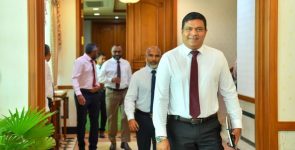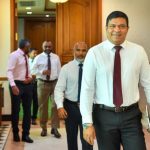
Former President Mohamed Nasheed has voiced his opposition to the Maldives Monetary Authority’s (MMA) regulation requiring tourism businesses to deposit and convert a portion of their foreign exchange earnings through local banks. The rule mandates that resorts and other tourism establishments exchange USD 500 per tourist at a local bank, a move that has reportedly faced resistance from resort owners.
In a message sent to a WhatsApp group of tourism entrepreneurs, Nasheed argued that the government’s focus should remain on tax collection rather than imposing additional financial controls on businesses. He emphasised that resort owners should have the freedom to manage their earnings after fulfilling their tax obligations.
“My view is that governments cannot dictate how individuals handle their own funds. Resort owners pay their taxes, and the rest is their return on investment—they should decide where to store or spend it,” Nasheed stated. He also stressed that attempts to build foreign reserves through regulatory measures have historically been unsuccessful, pointing out that business confidence, rather than legislation, drives the decision to retain funds within a country.
Nasheed further highlighted the dire state of the Maldives’ public debt, suggesting that the only viable solution is debt restructuring. He criticised the previous administration for failing to fulfil its 2018 election pledge to restructure debt, instead opting to issue bonds to cover existing liabilities. According to Nasheed, the current government faces the challenge of repaying USD 500 million this year, with an additional USD 1 billion due next year, which he claims cannot be resolved merely by increasing taxes.
Meanwhile, President Mohamed Muizzu addressed the controversy on social media platform X, defending the regulation as being in the nation’s interest. This statement followed concerns raised by several resort owners, including prominent figure Champa Mohamed Moosa, who cited difficulties in managing dollar reserves under the new policy.
The ongoing debate highlights the tensions between the government’s fiscal policy measures and the tourism sector’s concerns over financial autonomy and operational flexibility.











